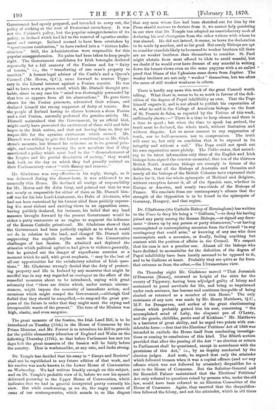Mr. Gladstone was very effective in his reply, though, as
it was delivered during the dinner-hour, it was addressed to an unusually thin House. He declined all vestige of responsibility for Mr. Heron and Sir John Gray, and pointed out that he was not nearly so responsible for either of them as Mr. Disraeli him- self was for his late Lord-Lieutenant, the Duke of Abercorn, who had not been restrained by his former chief from publicly express- ing the most violent and exciting views in an opposition sense, having publicly declared, for instance, his belief that any laud measure brought forward by the present Government would be either a party manoeuvre or an engine to augment the influence of the Roman Catholic priesthood. Mr. Gladstone showed that the Government had been perfectly explicit as to what it would not do in relation to the land, and charged Mr. Disraeli with suppressing the explicit replies made to the Conservative -challenges of last Session. He admitted and deplored the stimulus which political agitation bad given to violence generally, but he pointed out the danger of superfluous coercion at a moment which he said, with great emphasis, " may be the last of all our opportunities for the satisfactory solution of Irish ques- tions." Mr. Gladstone strongly denied that the duty of protect- ing property and life in Ireland by any measures that might be needful was in any way regarded as contingent on the effect of the remedial measures about to be introduced, saying with great solemnity that " there are -duties which, under certain circum- stances, might impose the necessity of immediate action, and occasions which might compel the Government,—although God forbid that they should be compelled,—to suspend the great pur- poses of the future in order that they might meet the crying and irresponsible wants of the present." The tone of the Minister was high, elastic, and even sanguine.


































 Previous page
Previous page